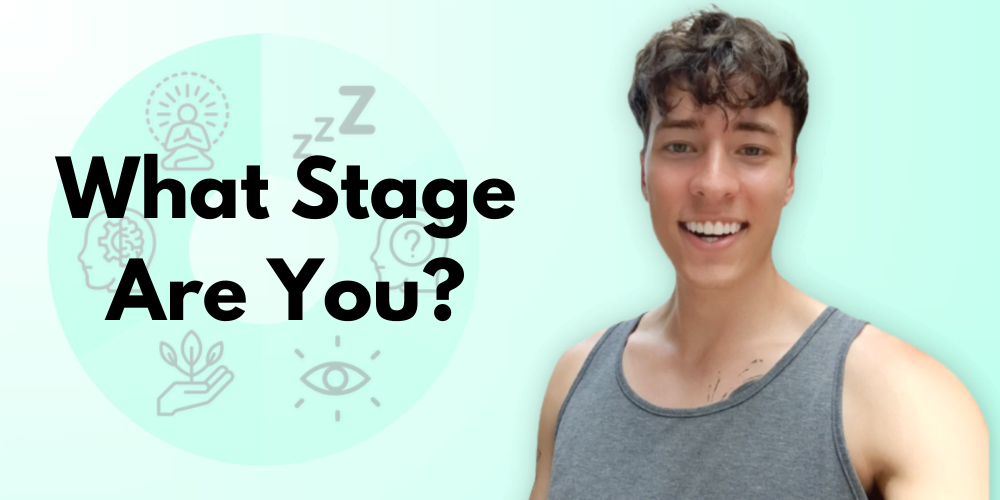How To Awaken Through Self-Inquiry Meditation
One of the most well known meditation techniques for spiritual awakening is self-inquiry, known in the Hindu tradition as Jnana yoga. This powerful technique involves questioning your thoughts and beliefs to gain insight into your true nature. By examining the stories we tell ourselves, we can begin to see through them and discover a deeper sense of peace and freedom. self-inquiry involves gaining insight into who we truly are by diving deeper and deeper behind the layers of identity we’ve placed on our consciousness. To begin practicing self-inquiry meditation, it’s important to understand the fundamentals of meditation. If you don’t know how to meditation please see my article on basic mindfulness meditation. With a solid foundation in place, you can begin to prepare for self inquiry meditation. Key Takeaways Fundamentals of Self-Inquiry Meditation What is self inquiry? Self inquiry is the meditative practice of exploring the “I” by questioning what the self really is. This may involve asking yourself simple questions like “Who am I?” or “What is the nature of my existence?” As you continue to explore these questions, you may begin to experience moments of insight and clarity. However, it’s important to be aware of the way your ego likes to trick you in this process. Understanding the Self Self-inquiry meditation is a practice that involves questioning the nature of the self. It’s a process of self-discovery that helps you to understand who you are and what your true nature is. The self is fundamentally a made up construct of our mind. The self that we think we are is simply a thought. Your body, your thoughts, and your identify are not really what you are. The self you think you are is just a set of thoughts and constructs that you’ve been conditioned to believe is you since your birth. As you continue to practice self-inquiry, you may find that your understanding of yourself evolves and changes. Any thought that arises of “self” is not the true self. This is because who we really are is beyond thought altogether. It’s something you must simply become aware of. The Role of the Observer The observer is a key aspect of self-inquiry meditation. It is the part of you that is able to observe your thoughts, emotions, and sensations without becoming attached to them. This is why basic mindfulness meditation is important for cultivating the observer. To cultivate the observer, start by simply observing your thoughts without judgment or analysis. Notice the thoughts that arise and let them pass without becoming attached to them. As you continue to practice, you may find that your ability to observe becomes stronger and easier. This can lead to greater clarity and insight into the nature of the self. This practice paired with continually turning in on the self and questioning it can lead to an awakening of true self. Preparing for Meditation Creating a Conducive Environment Creating a peaceful and quiet environment can help you focus and relax during your meditation. Here are some to consider before starting your self-inquiry practice: The Practice of Self-Inquiry Below is one of my favorite guided meditations for self-inquiry. I highly suggest this for a first dive into self-inquiry. The Questioning Technique To begin, sit comfortably and close your eyes. Take a few deep breaths and let your mind settle. Then, ask yourself a question such as “Who am I?” or “What am I really?” Allow the question to sink in and observe any thoughts or feelings that arise. Don’t try to answer the question with your mind, rather use your awareness to try and go deeper. Focusing the Mind As you continue to ask yourself these questions, you may notice that your mind becomes distracted or wanders off. This is very normal. When you notice your mind wanders, gently bring it back to the question of “who am I?” Deepening Awareness As you practice self-inquiry, you may begin to notice a shift in your awareness. You’ll start to see through constructs of the mind and reality. Insights can happen in a single moment and be a profound experience. You can have many awakenings this way, going deeper each time. You can keep going back to self-inquiry even after you’ve your first awakening. Challenges and Obstacles False Answers As you practice self-inquiry your mind will want to answer the question you’re presenting to yourself. Any answer you think of is not what we’re looking for. Sometimes we can even trick ourselves with very subtle thoughts. Any visualization or feeling you come up with is not it. You will know when it happens. What you’re looking for is a shift in awareness that is greater than the mind or any thought. It’s more like an a-ha eureka moment. Dealing with Distractions When practicing any kind of meditation distractions are to be expected. Our mind likes to focus on noise and mental chatter. To deal with these tempting distractions simply acknowledge them without judgment and gently return to the self inquiry practice. Self Inquiry FAQs Can self-inquiry meditation lead to a spiritual awakening? Yes, self-inquiry meditation can absolutely cause an awakening. In fact it’s one of the most well known practices used to intentionally achieve spiritual awakening today. Is Jnana yoga the same thing as self-inquiry? Jnana yoga and self inquiry are essentially the same practices. Jnana yoga is simply the original Yogic practice created in India that founded the method of questioning the self through meditation. Self inquiry is the Westernized name for Jnana yoga. How long does self-inquiry take to work? Results from self inquiry are different for everyone. Some people will experience an awakening within a few days of practicing self-inquiry while others will struggle with it for years before having breakthroughs.


